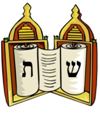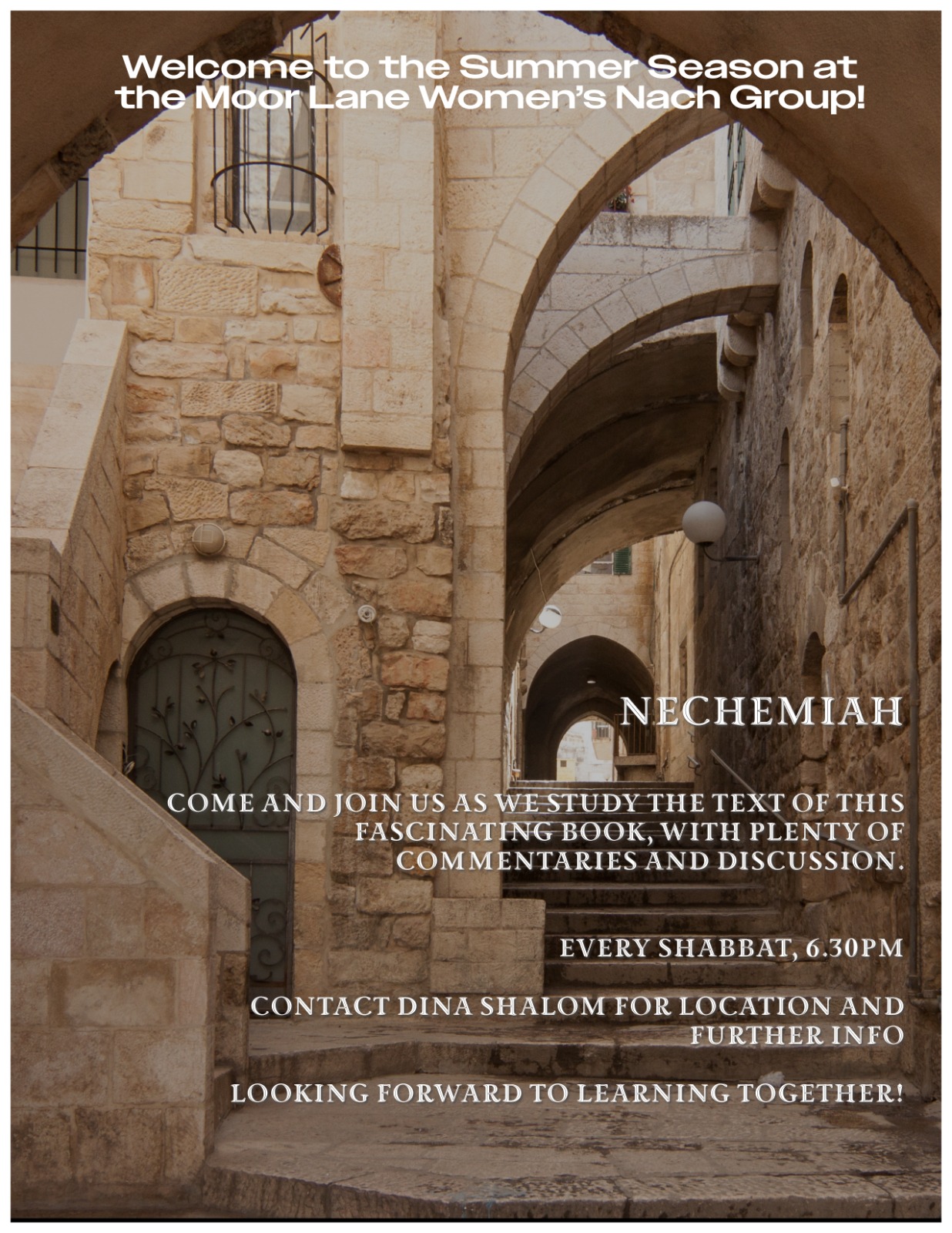
ק׳ ק׳ שׁערי תפילה

**********

לוח זמני תפלה לקיץ תשפ״ה
Summer Timetable 5785 – 2025
מוצאי שבת | ערבית )מוצ”ש( | שקיעה | סוף זמן קראת שמע | זמן שבת | פלג מנחה (תה״ד) | פלג מנחה (לבוש) | מנחה וקבלת שבת | תאריך | שבת פרשת |
Shabbat Ends | Arbit | Sunset | Shema to be read before | Candles to be |
| Earliest Candle lighting | Minha & Kabbalat Shabbat* | Date | Parasha |
PM | PM | PM | AM | PM | PM | PM | PM |
|
|
10:54 | 10:50 | 9:37 | 9:00 | 9:24 | 8:37 | 7:55 | 7:40 | 4/5 July | חקת |
🕯️SUMMER TIMES FOR SHABBAT 🕯️
שבת
קרבנות
9:00 am
הודו
9:15 am

מנחה
6:30 pm
****

****
The laws of the Parah Adumah, the Red Heifer, are detailed. These laws are for the ritual purification of one who comes into contact with death. After nearly 40 years in the desert, Miriam dies and is buried at Kadesh. The people complain about the loss of their water supply that until now has been provided miraculously in the merit of Miriam's righteousness. Aharon and Moshe pray for the people's welfare. Hashem commands them to gather the nation at Merivah and speak to a designated rock so that water will flow forth. Distressed by the people's lack of faith, Moshe hits the rock instead of speaking to it. He thus fails to produce the intended public demonstration of Hashem's mastery over the world, which would have resulted had the rock produced water merely at Moshe's word. Therefore, Hashem tells Moshe and Aharon that they will not bring the people into the Land. The Jewish People resume their travels, but because the King of Edom, a descendant of Esav, denies them passage through his country, they do not travel the most direct route to Eretz Yisrael. When they reach Mount Hor, Aharon dies and his son Elazar is invested with his priestly garments and responsibilities. Aharon was beloved by all, and the entire nation mourns him for 30 days. Sichon, the Amorite, attacks Bnei Yisrael when they ask to pass through his land. As a result, Bnei Yisrael conquer the lands that Sichon had previously seized from the Amonites on the east bank of the Jordan River.
Ohr Somayach Institutions www.ohr.edu

הבורר בשבת באופן אסור, אם מותר לאכול ממה שנברר
שאלה: אדם שברר בשבת באופן אסור, כגון שהיתה מונחת לפניו קערת אגוזים וקליפות, והוא הוציא את כל הקליפות מהקערה, ונותרו רק אגוזים. האם מותר לאכול מן האגוזים הללו בשבת?
תשובה: ביארנו כבר לפני מספר שבועות, שאסור לברור בשבת “פסולת מתוך אוכל”, אלא רק “אוכל מתוך פסולת”. וכן ביארנו שמותר לעשות כן רק אם עושה כן בידיו (ולא על ידי כלי מיוחד), וכן צריך שתהיה הברירה על מנת לאכול מיד את האוכל, ולא לאחר חצי שעה.
ובהלכה הקודמת הזכרנו את דברי מרן השלחן ערוך והרמ”א (בתחילת סימן שיח), שאסור ליהנות מדבר שנעשה באיסור בשבת. וכגון, מאכל שבושל בשבת, אסור לאנשים אחרים לאכול ממנו בשבת. וזה שבישל בעצמו, אסור לו לאכול מאותו המאכל לעולם.
ואם כן נראה גם בנדון השאלה, שמכיון שנעשה כאן איסור “בורר” בשבת, אסור לאכול מן האגוזים עד מוצאי שבת. וזה שברר בעצמו את האגוזים, אסור לו לאכול מהם לעולם.
ואם כן במקרה שלנו, מעשה האיסור לא הועיל כלל. ואין זה דומה למאכל שנתבשל בשבת, שאין אפשרות לבשלו בהיתר, ונמצא שעצם האיסור עשה את המאכל מבושל. שהרי כאן מעשה האיסור לא הועיל במאומה. וזה שאוכל מן האגוזים אינו “נהנה ממעשה שבת” במלא מובן המילה.
ולאחר שדן בזה בדברי הפוסקים, הביא את דברי הגאון רבי אליעזר יהודה ולדנברג ז”ל, בשו”ת ציץ אליעזר, שכתב שיש להקל בדבר, באופן שיחזרו לערבב יחד את הקליפות עם האגוזים, ואחר כך יוכלו לקחת את האגוזים מבין הקליפות. ועל ידי כך, אין כאן הנאה כלל ממעשה האסור בשבת, ללא ספק. ואף על פי שהגאון רבי יוסף חיים החמיר בדבר, מכל מקום להלכה העלו להקל בזה.
ולכן לסיכום: אגוזים שהיו מעורבים עם קליפות. ובא אדם וברר את הקליפות מבין האגוזים. דבר שאסור לעשותו בשבת. ואחר כך חזרו ועירבו את הקליפות עם האגוזים. מותר לאכול מן האגוזים בשבת, כיום שאין כאן הנאה כלל מעשה האסור בשבת.
Is it Permissible to eat food which has Been selected in a forbidden manner on Shabbat?
Question: If one selects food in a forbidden manner on Shabbat, for instance, if he had a plate of walnuts and shells before him and he removed all of the shells from the plate and only the walnuts remain in the plate, may one partake of these walnuts on Shabbat?
Answer: Several weeks ago, we have discussed that one may not select “waste from food” on Shabbat; rather, one may only select “food from waste.” We have also explained that even this is only permissible when this is being done by hand (not with the use of a vessel designated for selecting) and the selecting must be done in order to eat the food immediately (not after a half-hour’s time).
The Reasons to Prohibit Eating the Walnuts
In our scenario where walnuts and shells were mixed together on a plate and one came and removed all of the shells, one has essentially selected “waste from food” and has transgressed the Torah prohibition of selecting on Shabbat.
In the previous Halacha, we have mentioned the words of Maran Ha’Shulchan Aruch and the Rama (in Chapter 318) who write that it is forbidden to benefit from anything which has been done in a forbidden manner on Shabbat. For example, if a certain food was cooked on Shabbat, others may not partake of this food until Motza’ei Shabbat. The one who cooked the food, however, may not eat this food forever.
It seems that the same should apply to our situation, for since the forbidden work of selecting has been done to this food, the walnuts may not be eaten by others until Motza’ei Shabbat and the one who did the forbidden selecting cannot eat them forever.
The Reasons for Leniency
Maran Rabbeinu Ovadia Yosef zt”l discusses this matter at length and quotes the opinion of Hagaon Rabbeinu Yosef Haim in his Responsa Rav Pe’alim who prohibits eating the walnuts on Shabbat. However, Maran zt”l also discusses several reasons for leniency in this matter, for in our situation the person selecting did not gain anything from his forbidden manner of selecting as he could have just as easily selected in a permissible fashion by selecting the walnuts from the shells (which would constitute selecting “food from waste” and not the opposite). In this way, no prohibition would have been performed at all.
If so, nothing was gained by performing the forbidden work here at all. This cannot be compared to a food which was cooked on Shabbat, for there, there is no possibility of cooking it in a permissible manner and the actual prohibition is what caused the food to be cooked. However, in our case, the forbidden work did not result in any gain. This that one is now eating the walnuts cannot be considered a classical case of “benefitting from a forbidden work on Shabbat.”
After delving into the words of the Poskim with regards to this reason, he quotes the view of Hagaon Harav Eliezer Yehuda Waldenberg zt”l in his Responsa Tzitz Eliezer who writes that there is room for leniency in our case when the shells and the walnuts are once again mixed together and only then will one be permitted to remove the walnuts from among the shells. In this way, one is certainly not “benefitting from a forbidden work on Shabbat” in any way. Although Rabbeinu Yosef Haim rules stringently in our situation, others nevertheless rule leniently.
Summary: If walnuts were mixed with shells on a plate and one then selects the shells from the walnuts, which is indeed forbidden on Shabbat, if the shells are later re-mixed with the walnuts, one may partake of the walnuts on Shabbat since no benefit was achieved as a result of the forbidden work on Shabbat.